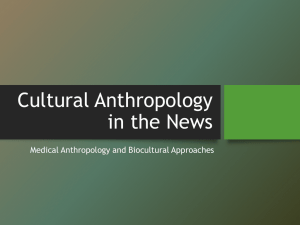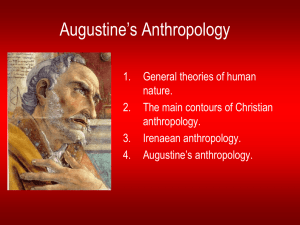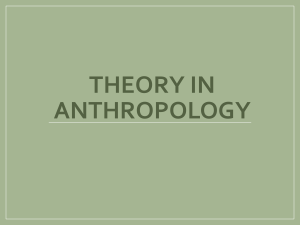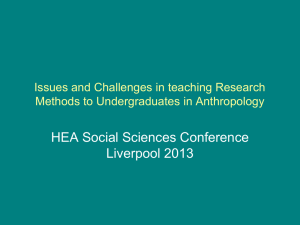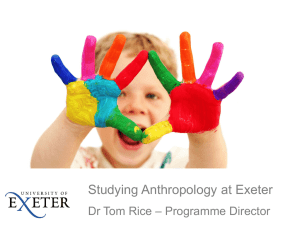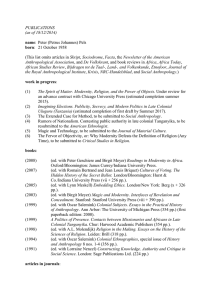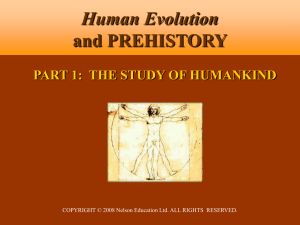Social anthropology of colonial and postcolonial sub
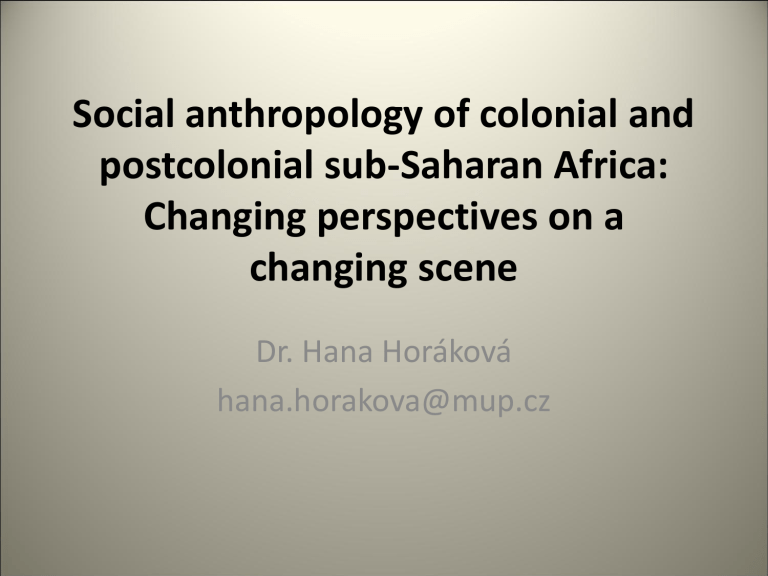
Social anthropology of colonial and postcolonial sub-Saharan Africa:
Changing perspectives on a changing scene
Dr. Hana Horáková hana.horakova@mup.cz
DOMINANT TENDENCIES IN
AFRICAN STUDIES
Date
To 1860
1860-1920
1920-45
1945-60
Connection Ideological-theoretical conformation
Dominating discipline
Exploration of Africa Exoticism of travel and adventure; origins of human society
Literature, philosophy, travelogues
Colonial conquest
Development
Justified by evolutionist theory
Ethnography
Self-justified.
Funct.anthropology
describes the reality of development without questioning its principle
Anthropology, applied anthropology
Decolonization “Colonial connection”.
Transition of anthropology to sociology suppression of scientific exoticism.
Anthropology;
Sociology; sociology of underdevelopment
Date
1960-1989
1989-
Connection
Neocolonialism
Postcolonialism
Ideologicaltheoretical conformation
Dominating discipline
Discovery of illusions of independence.
Radical criticism of the “connection”.
Marxist revival.
Anthropology, sociology, and political economy.
Pursuit of their unification.
Development studies
Postmodernism.
Discourse on culture, identity and politics.
Afropessimisme.
Interdisciplinary.
Postcolonial , subaltern, post development studies;anthro of colonialism, comparative political science; literary critique
• traveller→explorer→missionary→soldier
• administrator (representative of political power)→ethnologist/anthropologist as an organized professional→another scholar in social sciences and humanities
Great Britain
• applied anthropology
• functionalism
• acculturation
France
• monograph-catalogue total social fact technology cosmogony
Colonial conquest 1860-1920 and the early social anthropology
• Social evolutionist theory
• Diffusionist models
• “To the Victorians, anthropology was the parlance and the practice of a society which gave itself the alibi, the good conscience and the luxury of a ´scientificity´ in its colonial experience.“ (Leclerc 1969)
• Mason: The uncivilized mind in the presence of
higher phases of civilization. American
Association, 1881
• Wilson, G.S., ´How shall the American savage be civilized?´, Atlantic Monthly, 1881
• Orgeas: La pathologie des races humaines et
le problem de la colonisation, 1889
• Kathleen Gough (1967): “Anthropology is the child of Imperialism.” Kathleen Gough (1967):
“Anthropology is the child of Imperialism.”
• the connection between anthropology and a broader European tradition of ´involved exoticism´ (Davies 2003: 155)
COLONIAL ANTHROPOLOGY: major changes of theoretical paradigm
• 1920-1960: the classic period of the growth of social anthropology
• British social anthropology
• 1) long-term fieldwork
• 2) functionalism/structural functionalism
• 3) historical context of the British colonial situation in Africa
• Applied anthropology
• Radcliffe-Brown
• Fortes: African Political Systems (1940)
• Evans-Pritchard: Witchcraft, Oracles, and
Magic among the Azande (1937)
Postcolonial anthropology
• „The destruction of the colonial order following World War II left anthropology particularly applied anthropologists open to attack. Nationalist leaders who had replaced colonial administrators identified anthropologists with the former colonial regimes, viewing anthropologists as agents of colonial repression.“ (Howard 1996: 400)
• Social anthropology - a tool of domination
• Rivet: ”There is no good colonization without well-conducted ethnology” (1937)
• Daryll Forde: “It must be admitted that in many cases the colonial governments did much for the Africans (1967)
RADICALISM IN AFRICAN STUDIES OF
THE 1960-1970s
• anti-capitalist anthropology
• „Complicity of anthropology“
• „handmaiden” of colonialism (Asad 1973)
Peter C.W.Gutkind and Peter
Waterman: African Social Studies. A
radical reader (1977)
• Examinations of colonial anthropology by
Onoge:
• “anthropology followed the flag into Africa”
• “the morbid perversion of much of Africanist anthropology”
Consequences of the crisis: self-reflective anthropology
• reverse report
• reflexive anthropology
• advocacy anthropology
Contemporary anthropology of Africa five aspects of critique-Falk Moore (1994)
• 1) issues of neocolonialism
• 2) classic economic teorie, dependency theories,
Marxist theories, world-system teorie
• 3) the need to rewrite the existing anthropological literature with the aim to redress the past fallacies
• 4) the need to reevaluate all ethnographies through the discourse of power
• 5) dilemma of dialogue, translation, and representation
There is more to it…
• The urge of interdisciplinarity
• The relation between anthropology and development
• A new dimension between Europe and Africa
(AEGIS)
Interdisciplinarity
• comparative politics (Chabal, Bayart,
Hibou,etc.), international relations, political theory
• Postmodernist Culture and Politics: moral and political dimension of culture difference
• Anthropology of colonialism (Pels, Comaroffs)
• Postcolonial studies, Postdevelopmental studies, Subaltern studies
Anthropology and development
• part of theory and practice of development agencies, voluntary organizations, international institutions and governments
• “strategy of governance”
• Anthropologists as culture-brokers
CONCLUSION
• A new anthropology has emerged from the crisis of the postcolonial era
• Shifts in theoretical and methodological frameworks
• From “structure” to “process”
• African societies are “historically contingent, with permeable and changing boundaries”
(Grinker and Steiner 1997: xxv)
CONCLUSION
• Methodologically, anthropology remains in the forefront of the exploration of new methods of research in the social sciences.
• Empirically, anthropologists are today, as they have always been, at the centre of most contemporary issues of serious human concern.
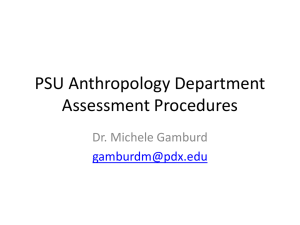
![4[1]._a_man_as_a_person](http://s2.studylib.net/store/data/005226893_1-b67b2be2c3623c1c44b6baa80b997c62-300x300.png)
